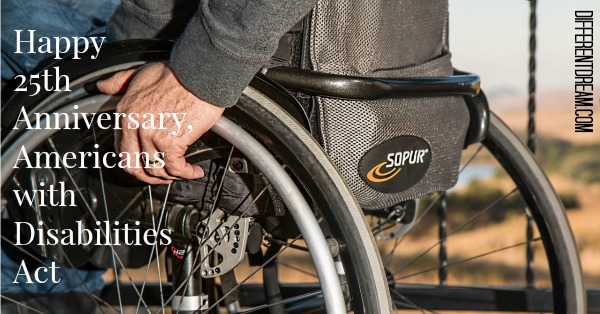Happy 25th, Americans with Disabilities Act

The Americans with Disabilities Act (ADA) turns 25 tomorrow. Government and civil rights organizations around the country will be celebrating the passage of legislation that did much to guarantee the rights and opportunities of the disabled.
What Is the Americans with Disabilities Act?
According to the government’s ADA website, “The Americans with Disabilities Act (ADA) was signed into law on July 26, 1990, by President George H.W. Bush. The ADA is one of America’s most comprehensive pieces of civil rights legislation that prohibits discrimination and guarantees that people with disabilities have the same opportunities as everyone else to participate in the mainstream of American life — to enjoy employment opportunities, to purchase goods and services, and to participate in State and local government programs and services. Modeled after the Civil Rights Act of 1964, which prohibits discrimination on the basis of race, color, religion, sex, or national origin – and Section 504 of the Rehabilitation Act of 1973 — the ADA is an “equal opportunity” law for people with disabilities.”
How the Americans with Disabilities Act Changed Life for Families
The Americans with Disabilities Act wasn’t around when multiple sclerosis landed my dad in a wheelchair around 1960. Most of the stores in our town were off limits to him. He couldn’t maneuver his wheelchair into the post office, the library, our church, his children’s schools, the doctor’s office, or the hospital. Because the sidewalks on our block ended with curbs, he had to use driveways to cross the street.
By the time the ADA was passed in 1990, Dad was bed-ridden in a nursing home. But whenever I saw–and still see today–public venues that are accessible to people with disabilities, I think of how wonderful the ADA is and how much Dad would have gloried in it. Every cutaway curb most people take for granted, he would have considered a miracle. A gift. A small delight to savor. A reason to be grateful.
Celebrating the Americans with Disabilities Act
ADA celebrations will be going strong tomorrow. You can check out the ADA Legacy Project website to find a celebration near where you live and join the fun if you like. Or, if you can’t make it, take a walk outside with someone who has a disability. Do a happy dance each time you see an accessible building, a cutaway curb, or a person with disabilities employed and doing meaningful work. At the same time, make a list of physical and attitudinal barriers that deny equal rights and opportunities to people with disabilities. Come Monday, get to work using the ADA to break down those remaining barriers one at a time. So much remains to be done!
How Has the ADA Changed Life for Your Family?
Has the ADA made a difference for your family? Leave a comment about it in the box below!
Do you like what you see at DifferentDream.com? You can receive more great content by subscribing to the quarterly Different Dream newsletter and signing up for the daily RSS feed delivered to your email inbox. You can sign up for the first in the pop up box and the second at the bottom of this page.
By Jolene
Jolene Philo is the author of the Different Dream series for parents of kids with special needs. She speaks at parenting and special needs conferences around the country. She’s also the creator and host of the Different Dream website. Sharing Love Abundantly With Special Needs Families: The 5 Love Languages® for Parents Raising Children with Disabilities, which she co-authored with Dr. Gary Chapman, was released in August of 2019 and is available at local bookstores, their bookstore website, and at Amazon.
Subscribe for Updates from Jolene
Related Posts
The Lessons I Learned while Raising a Child with EA/TEF
Jolene Philo reflects on a lifetime of lessons learned while raising a child with EA/TEF and shares the insights she’s won.
Looking Back at Your Child’s EA/TEF Journey
Looking back at your child’s EA/TEF journey can give parents a new perspective about past events. Guest blogger Maggi Gale shares how her look back clearly showed her how God was with their family during their daughter’s very unusual first weeks of life in 2002. Three...
How Do I Let Go of My Adult EA/TEF Child?
Valeria Conshafter explores the question “How do I let go of my adult EA/TEF child?” for EA/TEF Awareness Month.






0 Comments